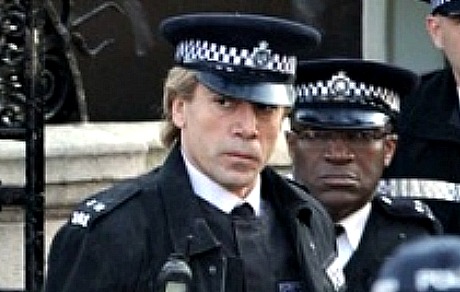I’ve never cared for the tendency of big-budget action film producers to hire interesting European actors who’ve recently become iconic figures among Joe Popcorn types to play a villain. Javier Bardem is an exceptionally charming and gentle fellow who thinks like a poet, but that cuts no ice here. Skyfall director Sam Mendes and 007 producers Michael G. Wilson and Barbara Broccoli are apparently thinking as follows: (a) Bardem won an Oscar for playing a creepy maniac in No Country for Old Men so (b) “we want some of that too!”

I’m sure Javier appreciates the paycheck, and I suppose one could do worse if you’re casting a 007 villain, but there’s nothing for baddies to do in these films except exhibit a certain perverse flair. There’s nowhere else to go. Bardem is playing more or less the same guy that Gert Frobe and Christopher Walken and Joseph Wiseman and Klaus Maria Brandauer and Christopher Lee and Yaphet Kotto played in their respective outings. It’s a box, a prison.
On top of which I’ve been nursing a dislike for Wilson-Broccoli for almost 20 years now. Wilson-Broccoli are two of the biggest lame-os who ever inherited a janitorial foothold in the action film racket. Trust me — I’ve heard stories about them from more than a few formidables. They’re caretakers.
To judge by this recently-captured photo from the set of Skyfall, the latest James Bond thriller starring Daniel Craig, Bardem has been working out and cutting out the carbs and the drinking, and is obviously adorned with blonde-ish hair (i.e., 007-ese for malevolent). Bardem was performing in a recently shot Skyfall scene in which his character, Silva, impersonates a London policeman. Who gives a shit about any of this? And yet here I am writing about it.
Skyfall will open on 10.26.12. The screenplay is by John Logan, Neal Purvis and Robert Wade. The great Roger Deakins is shooting it. I’m sure Mendes will make excellent use of his talents.
The Wikipage synopsis: “James Bond’s loyalty to M (Judi Dench) is challenged over secrets from her past. When MI6 is attacked, it falls to Bond to seek out and eliminate the threat regardless of the cost to himself.” I’ve read that Dench buys the farm.



